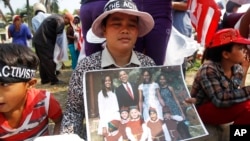Thun Saray, president of the rights group Adhoc, urged Cambodia’s leader to use their newfound political “culture of dialogue” to resolve the problem of chronic land disputes across the country.
Though the number of such disputes has decreased over the last six months, compared to the same period last year, a large number remain, he said.
Land disputes and the displacement they cause have emerged as one of Cambodia’s top problems over the last decade.
Thun Saray said the current political climate, where ruling party and opposition leaders are able to negotiate with each other, could be an advantage to finding a solution.
“If they need additional or updated information, we can provide the information which will be enough to make a decision and find a solution,” he said.
Many land disputes are protracted and ongoing, due to the lack of political will to solve them at various levels of government, he said. He cited as examples disputes involving a sugar plantation in Lor Peang, Kampong Chnang province, or a Chinese company in Memot, Kampong Cham province, or disputes with local villagers and powerful individuals in Mondolkiri and Ratanakkiri provinces.
Adhoc issued a new report on land disputes for all of 2014 and the first half of 2015, detailing 140 complaints involving nearly 10,000 families and nearly 25,000 hectares. Provinces dealing with the most disputes were Siem Reap, with 28, Kampong Cham, with 12, and Banteay Meanchey, also with 12.
Military officials, high-ranking government officials and powerful business tycoons are those most often involved in these disputes, and they rarely face legal repercussions, Adhoc said. Meanwhile, 121 land activists have been arrested, with 68 jailed, in the last 18 months, the report notes. Of those, seven remain in prison.
Sok Eysan, a spokesman for the ruling Cambodian People’s Party, told VOA Khmer the government is taking action on land disputes and has arrested and jailed the rich and powerful, as well. But the so-called “culture of dialogue” between the ruling party and opposition is not related to such legal processes, he said. “These are not political issues,” he said. “The land issues are technical issues.”
Eng Chhay Eang, chairman of the complaints committee for the National Assembly and Senate, said he couldn’t confirm the number of complaints they’ve received on land disputes. Those that are being solved are old cases that had been “locked” for years, he said. “We can’t solve land disputes immediately, because the issues occur over years,” he said. “It’s like a chronic disease. We can’t heal this disease quickly.”
Ou Virak, head of the think tank Future Forum, said land disputes “and other violations, including corrupt courts,” should be top priorities for the leaders who now find themselves able to have a dialogue.







